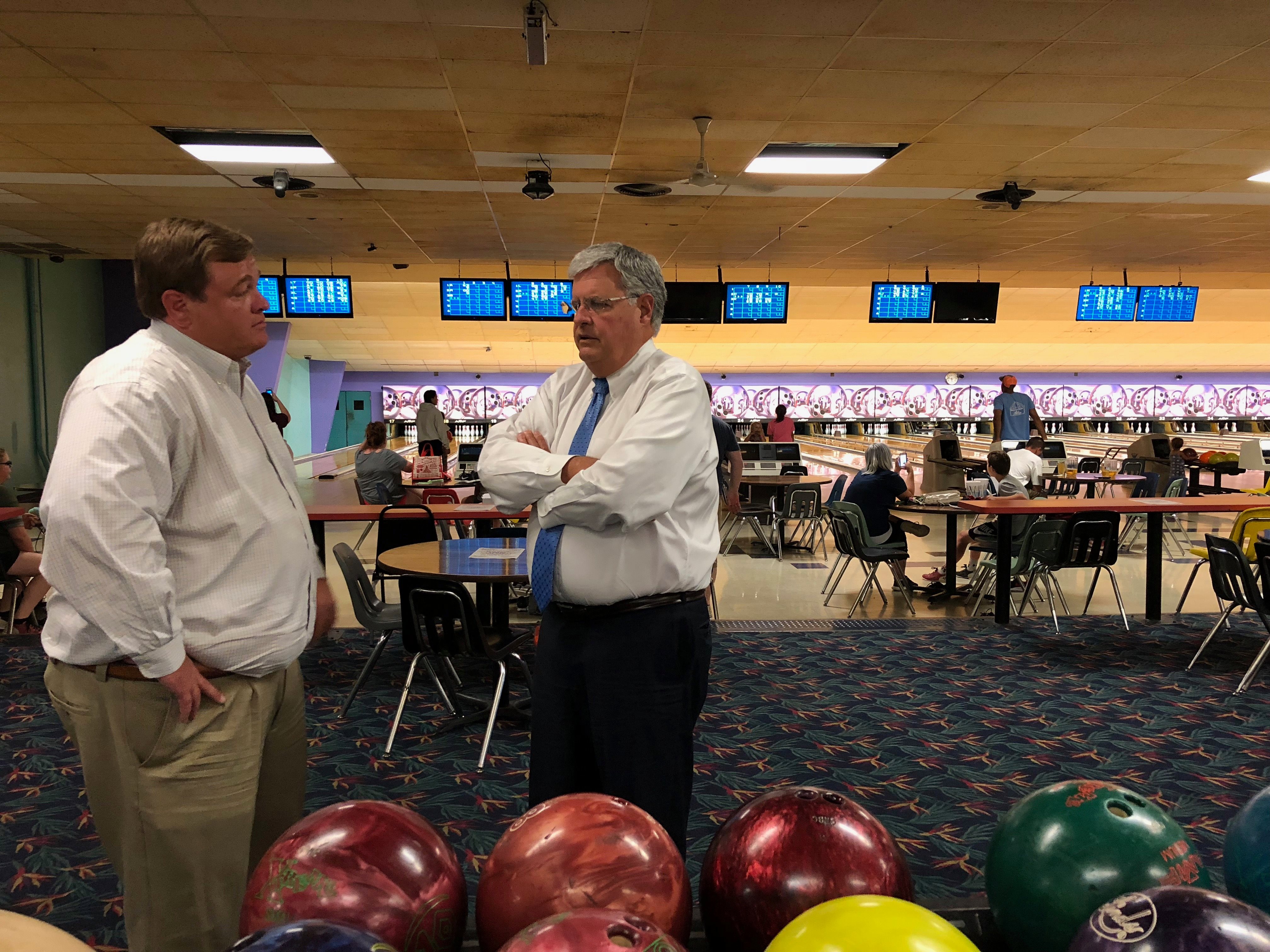Sixteen-year legislative leader Sen. Ron Richard – the only man in Missouri history to serve as speaker of the Missouri House and president pro tem of the Missouri Senate – reflects on his roots and entry into politics.
This is part one in a multipart series.
Transcription:
Q. Right now at Fourth Street Bowling, did I say that right, Senator?
A. Fourth Street Bowl.
Q. Fourth Street Bowl. Joplin, Missouri, in an office that a lot of folks in the state have come to with the only man in the history of the state ever served as Speaker of the House and president pro tem of the Senate, Senator Ron Richard, we’re honored to be here.
A. Thanks for coming, I know it’s a long drive, sorry I couldn’t make it to St. Louis, but every time you called I was in the middle of either helping someone in campaign or fundraising and it just didn’t work out.
Q. Well, I think doing this interview about your life and your career is probably, there’s no better place to do it than right here so we’re honored to be here.
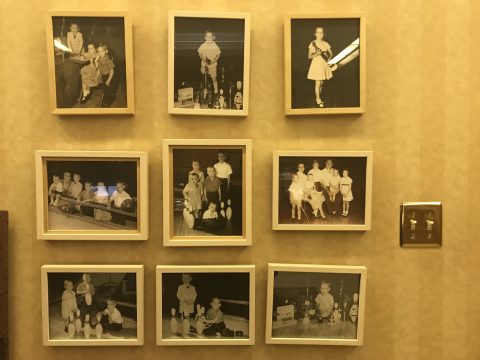 A. Well, with this office, the pictures of my brothers and my sister and my dad and mother, it’s probably the right place to be.
A. Well, with this office, the pictures of my brothers and my sister and my dad and mother, it’s probably the right place to be.
Q. Well let’s start off with you grew up in Kansas, actually, right, born in Kansas?
A. Born in Parsons, Kansas. My dad had a little bowling lanes after World War II that he bought from a guy, and he got a call one day in the middle ’50s from Falstaff Beer in St. Louis and Chicago, their team bowling was big then promoting beer, out of Chicago, wanted my dad to join them and some of the old timers said to my dad, “You beat us out here when we’re hustling and doing those things,” because there was no tour and they would go to bowling tournaments and my dad was a true hustler and he said why don’t you, told my dad join the team. So he packed up, I mean my dad had a lot of guts, five kids, his wife, sold his little business, and went to Chicago, for a couple hundred dollars a month with a bowling ball in his trunk and that’s how he made it. I mean he’s something.
Q. Tell folks a little bit more about your dad, in this office, you could see, I mean the accomplishments of his career but tell folks what he was like?
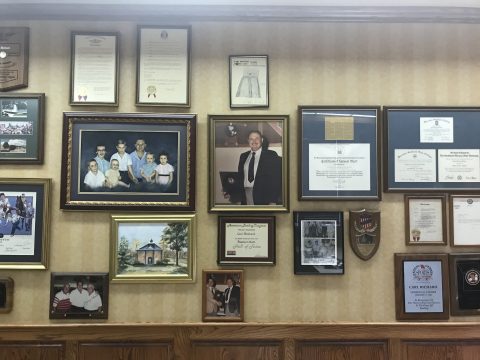 A. Well, he did whatever he could to make a living. I mean when he was young, he was in the World War II of course, and he has always been in the bowling business, but he was really good at what he did and a businessman, but on the lanes, he was second to none, I mean he competed with people who traveled worldwide, and did fairly well. He got tired of, in St. Louis, got tired of traveling so he bought this place here and we expanded. My brothers joined so I have had the privilege of working for my dad and mom and brothers, it’s been unique, and then I remember when I decided to start getting into politics, they all looked at me and said, “What does it pay?” And they told me, “What do you do that for?” So that’s kind of how he thinks.
A. Well, he did whatever he could to make a living. I mean when he was young, he was in the World War II of course, and he has always been in the bowling business, but he was really good at what he did and a businessman, but on the lanes, he was second to none, I mean he competed with people who traveled worldwide, and did fairly well. He got tired of, in St. Louis, got tired of traveling so he bought this place here and we expanded. My brothers joined so I have had the privilege of working for my dad and mom and brothers, it’s been unique, and then I remember when I decided to start getting into politics, they all looked at me and said, “What does it pay?” And they told me, “What do you do that for?” So that’s kind of how he thinks.
Q. Tell folks about your mother.
A. Yeah my mother was a real quiet influence. She was a banker, and she kept books for the corporation, and then she met an untimely death with cancer in 1988 and just when all of our business just started really gelling and she left us, kind of a shame.
Q. So looks like your schooling was not public school, right? You bounced around a little bit but ended up going to Catholic school?
A. I was in Catholic school. When you’re in St. Louis, they all ask you what school you go to. Well here you go, I went to Saint Williams Grade School in Winston Terrace. When that whole neighborhood was most of McDonnell Douglas people and manufacturing people and my dad, it was just a little bit from Lambert Field so you catch an airplane and go wherever you had to go and we went to school in O’Fallon, went to Assumption, and then from there we came down here to St. Mary’s, but been in private school. My mother is a devout Catholic and she wasn’t a Catholic all her life. She married my dad and she was, not Catholic, but she joined him but she was very fervent and she demanded we go to private school so that’s what we did.
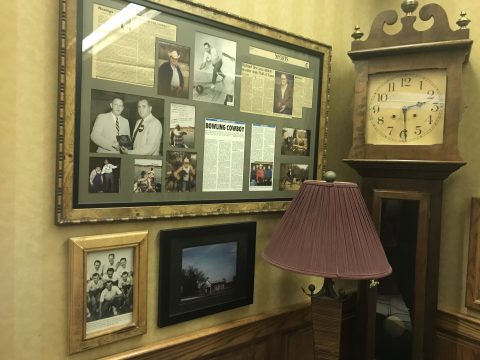 Q. Tell us about your brothers and sister?
Q. Tell us about your brothers and sister?
A. I’ve got my sister, she married a guy I went to high school with, played basketball with and they’re out in Arizona, he worked for TWA and then worked for other companies before TWA fell on tough timings, he’s a CPA, and they retired in Arizona. My brother Davey, he just retired. He was in this business for a long time and then decided to make a career change and went in the lumber, selling lumber on the road and other products and he retired this last year. He lives on a farm outside, up by my dad 15 miles north of here.
Brother Randy runs our operation in Fort Smith. This bowling lanes here is 40 lanes and Randy runs our 72 lane operation in Fort Smith, biggest bowling lanes in the south and Barry is out on the farm. He retired, and then went to the farm. He runs a small operation, about 800 acres but he does some farming and stuff.
Q. So you’re Missouri Southern grad?
A. Missouri Southern, yes, 1969, and I went to Missouri State and got a masters in 1971.
Q. Was that always something, was college just what you were gonna do or was that normal for your family?
A. No. I was the first one to go to college in my family, both sides, we just didn’t do that and I had a neighbor that turned out to be a doctor and I was floundering around and he said, “You just need to get in school and keep going,” so my next door neighbor was a pretty good influence, his name was Bill Cook, orthodontist here in town, he retired, so I went to college, but the Vietnam War was going on so that’s what you did, if you, you know, so I graduated in ’69 and I thought I was gonna go to law school. I thought I was going to be an F. Lee Bailey or really do something on the bench, and so I went and started my masters, and October 6, 1969, I got drafted and I went to my physical in Kansas City, all my buddies, two buses from down here, went up and we got in three lines at the end.
It said Union Station, Kansas City, everybody went to the basement, and this incident was sent everybody get in three lines and then I was back, just walked, said you last one there, “Dress it up, dress it up,” so I got over there and went to this line here and the guys in it said, “You guys are in the Army, you’re going to be leaving in ten minutes. You guys in the Army and going to be leaving in ten minutes, and guys are the Marines.” I was in the Marines! You’re going to Camp Pendleton in a week or two, we’ll call you. I never got the call. I’m still waiting on the call. I would have went, I didn’t care, I mean I would have went. I never got a call, I didn’t fail it for health or anything. Just never got a call.
Q. Those guys in the first two lines in 1969…
A. They went.
Q. …saw pretty heavy fighting?
A. Went to Vietnam, Germany, and all over the place and some didn’t come back.
Q. Did you ever think in government think to ask why they didn’t call?
A. Every time I see a Marine I say I was one for about 20 minutes. That’s about it.
Q. So you go to Missouri State for the masters?
A. I did. Recent American History.
Q. Like your friend said, just keep going to school?
A. Yeah, still thought I was gonna go to law school and then I just didn’t do it. I mean I was kinda losing track of what I want to do and I came back and joined my parents and I just progressed in and I always wanted to do something on my own but I never really did it. So I got in politics, after a fashion.
Q. Before then you got into business.
A. Well, here with my parents, yes.
Q. So you had a history degree, which I’m sure was valuable in politics?
A. Yeah, it had no bearing on what I was doing around here, but it was history, was interesting and I tried accounting, and economics, and it just didn’t do something for me. I wish I would have tried harder, I probably would have been pretty good at that but our business has been pretty good, over, this building you’re in 60 years we have been in business.
Q. So this is just a family business, right?
A. It is.
Q. Kinda came up in?
A. It is, it is and we’ve all done everything. I can do anything in and all my brothers and sister, we can do anything, any job.
Q. So tell, how did you meet your wife?
A. Well my first wife, Dana, was high school sweetheart, married about 20 years, had a daughter Cara Lee and things just didn’t work out, and then I was single and took my daughter and I was a single dad, raised her, and finished her up in high school, and sent her to University of Missouri and I met Patti, my wife now, for almost 25 years, will be 25 years next year, and were married in 1994 and actually we just renewed our vows with a priest last October.
Q. Congratulations.
A. We have a little Irish priest that really a neat guy down here, Father Monaghan and my wife, we were married in Branson at that church, the glass church down there, I don’t remember what it’s called, and she always felt kinda funny because she’s Catholic, too, so I got her married in the church.
Q. Legit paperwork, right?
A. She’s legal, yeah.
 Q. Well tell us about her, what does she like to do? How does she keep you in line with you driving all over God’s half-acre in politics?
Q. Well tell us about her, what does she like to do? How does she keep you in line with you driving all over God’s half-acre in politics?
A. She don’t, she’s pretty good about understanding but I mean like…
Q. That’s a lot to understand.
A. she didn’t know anything about politics, still not sure she does, but you know when I put her in front of a crowd, I mean she was instrumental in passing legislation a couple years ago on breast cancer awareness, on getting that xray, that lets women know, it’s a second x-ray, know when they have a tissue issue, and I told her, “you need to pass this” and Dan Brown’s wife, too, I said you guys need to go to hearing, we’ll introduce the bill and you guys need to work it. They did it, passed unanimous in the House and Senate. She was a banker, retired, 10 or 12 years ago and she’s been with me, she’ll give a talk once in a while but she kind of stands back. She don’t really want to be in the front, but she’s best looking thing I’ve ever seen.
Q. Is she from Joplin, where is she from?
A. From Joplin. Her mom and dad moved down here from Omaha and worked for a company that made power steering units for automotive industry and called Vickers, and then he was CPA, and all Patti’s family was CPAs and accountants from Omaha, some worked for the railroad up there, UPS.
Q. And so about the time you were getting married to her you were getting into politics locally?
A. I was mayor of Joplin. I started down here in the middle ’80s. A friend of mine put me on the zoning board, and I just didn’t like the way things were going.
Q. I’m sure a lot of Democrats would like to go talk him out of that back in time?
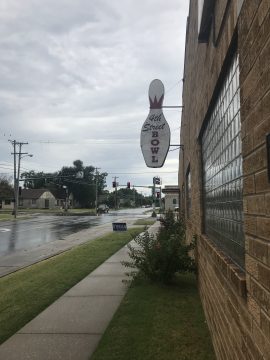 A. Probably want to slap him, don’t they.[LAUGHTER]. And when Mac was in the bar here playing shuffle board, Don Gates his name, come by say “You want to be on the zoning board? You’re always complaining about things aren’t right around here and aren’t business friendly,” and I said fine. So I was on the zoning board for three years and then I went to chairman of the zoning board and from there I ran for city council and then I ran for mayor and then after I was mayor, and still that was probusiness, you create jobs, get training, before job training was cool, and create a reason to live in this community, a reason to retire, raise your kids, you know, I am old fashioned. I like my community, like riding a bike in the community, and you know, and just having neighbors who wave at you and that’s kind of, maybe I’m folksy but that’s just the way I am.
A. Probably want to slap him, don’t they.[LAUGHTER]. And when Mac was in the bar here playing shuffle board, Don Gates his name, come by say “You want to be on the zoning board? You’re always complaining about things aren’t right around here and aren’t business friendly,” and I said fine. So I was on the zoning board for three years and then I went to chairman of the zoning board and from there I ran for city council and then I ran for mayor and then after I was mayor, and still that was probusiness, you create jobs, get training, before job training was cool, and create a reason to live in this community, a reason to retire, raise your kids, you know, I am old fashioned. I like my community, like riding a bike in the community, and you know, and just having neighbors who wave at you and that’s kind of, maybe I’m folksy but that’s just the way I am.
And then I ran, I thought I was unbeatable. I thought could I beat anybody so I ran against Marvin Singleton, outraised him, outworked him, lost by six thousand votes.
Q. Now for state rep or state senate?
A. State senate and I thought I could just make the leap.
Q. So you’re involved in local politics, the person, people think about that’s a little older than me would be Dick Webster. Now it may be you, but what was your interactions with Senator Webster?
A. Well, Dick Webster and I were friends, but he was involved in a lot of stuff statewide and him and I, you know, I knew him, I knew both his sons. I had a pretty good relationship with the whole Webster family [cell phone ringing] but he wasn’t really involved in anything I was running in politics until I got elected in Jeff City and then he was passed on by then, but I ran against Marvin Singleton and lost and then I had a friend of mine said, “You know what you ought to do? He’s having a fundraiser day after election you ought to go by and write him a check,” so I did. I walked in there and said, “You won fair and square. Here’s $500.”
Everybody in that room said, “when he’s term-limited, you’re the guy.” That’s where I run my race right there and since then, I’ve never, I was elected in 2002, and every two years, ’04, ’06, ’08, I was elected Speaker of the House against St. Louis guy Allen, who’s one of my better friends Allen Icet and then I appointed him budget chair the same day and then I ran for the senate. Never had any opposition since then.
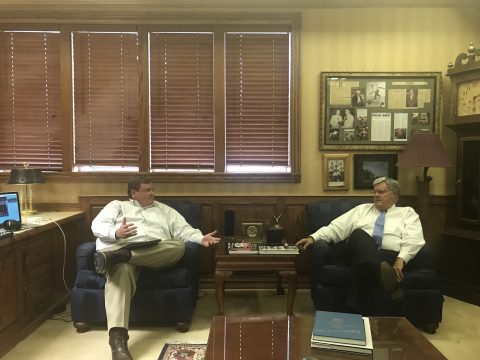 Q. So you run for that and tell us about local government. It’s just a different animal, isn’t it? It’s not partisan, it’s, what was being mayor like?
Q. So you run for that and tell us about local government. It’s just a different animal, isn’t it? It’s not partisan, it’s, what was being mayor like?
A. What was mayor of Joplin being like? Well I was, you know, I was kind of like Jessie, I’m a little outspoken sometimes, but I pressed the attack whenever I can, because I think we need to move in a direction, sooner rather than later, and when I was mayor, I was able to try to convince the other members that we need to go a certain direction. Some days you won, some days you didn’t win, nine person, it takes five. So getting five sometimes, but I was with a couple of buddies that on there, too, that served and had the same vision and we won most of the time and I had a pretty good staff at city hall. We had our good city manager, but I liked pressing the attack. I mean I like, I was, you know, 50something years old when I started, when I went to Jeff City I was 55. People were leaving, retired, going home and I was just starting and people, guys, and when I was elected I sat next to Jay Wassa SP, mayor of NIxa and what a character he is, I can tell you hunter stories about him and we’ve been friends ever since but he’s older, not as old as I am, not as old as I am, but I, sometimes I lay awake at night, if I had started a little earlier with things and things would have fell through, what would have happened, but you know sometimes it just works that, when a door opens, you walk through it and people ask me about running for office. And I say if you have an opportunity you can try it because you can sit on your porch with a rocking chair and say, “Boy I wish I would have tried that, or I tried it I didn’t work.” I’d rather be one of the guys that tried.
Q. Teddy Roosevelt quote about the man in the arena seems to apply a little.
A. Yeah, Dan Mehan takes the credit for that. Gets an award for that.
Q. So when you go to run for state rep, you had already made a friend and you thought obviously being mayor, looks like a little token opposition, but not much, right, the 75/25 something?
A. Yeah that wasn’t much, didn’t take too much to win that race, and yeah I came and I was elected, with the big first republican class, 50 years in the house with Catherine Hanaway as speaker, by the way may have been the greatest speaker ever lived.
Q. Before we get into that, tell us about your kids and where they are and what they do.
A. My daughter Cara Lee she’s in Southern California, met her husband at the University of Missouri, he’s from St. Louis, Rick Seibert – he’s a developer, develops low income housing in St. Louis, I have three grandkids, they were just here July 4. Then Patti has a son Chad who is an architect and he has two little girls. So that’s, and he went to University of Arkansas so I always had the pleasure of getting married, and helping with two kids at universities, and that’s painful, if you haven’t had two kids in University at the same time but we made it.
Q. I have two kids, I’m hoping community college for ’em?
A. Well you know, you’ll do what you have to do. There’s a lot of opportunities that. Rolodex kids find when they go to university lasts them a lifetime.
Q. Let’s talk a little bit about style is before we get into the events of speaker. Your friends call it candid and direct. I guess detractors might call it gruff. You have to know it as you’re far more direct or gruff than most of your contemporaries. Why do you think that is?
A. Well I didn’t really care if I was ever got elected again.
Q. Yeah, you never had another opponent?
A. No, but I thought, when I started 55 years old, I thought people ought to understand exactly what’s on somebody’s mind because you always get the worst in the DC or the Jeff City twostep from a lot of people and I made up my mind I wasn’t gonna do that. I was going to speak exactly what’s on my mind. I thought I knew what people liked and didn’t like, and I was gonna try and push decisions, the same thing I did down here. Job creation, economic development, make our community better, get a partnership, win every day, and make the place better and when I, and when Rod Jetton made me chair of economic development, I thought I died and went to heaven. I wouldn’t care if I ever did anything else. Back then we did every economic development bill, all the things going on now we started back then.
Q. Of all the stuff, you’ve got a resume of accomplishments that are at the heart of all the big republican stuff that’s happened but there’s an element besides being gruff, sometimes I think, it appears to me, just watching your career, that sometimes you don’t mind if people underestimate you a little bit and maybe you help them to that conclusion?
A. Well maybe I’m not very smart, maybe I am. I don’t know. I let people figure that out themselves. I don’t, that, when Todd Richardson was going through what he had to go through in the House the last few months, and I was, because I knew his dad. His dad is a great guy. His dad could have been speaker too but just didn’t get the majority in time.
And Todd was losing weight and you know I think his wife read one of my comments or something, or one of your posts or something on the Times, and got him checked into the hospital. He was losing weight, smokes anyway, but he looked like a chimney, I mean he was having, it was all the time, 24 hours a day so I was trying to go over to help him in the decision making process, and I made the comment one time you know, I hate to be gruff all the time but I’m, and I read the quote somewhere, I was reading something late one night, I’m the gruff guardian angel of the House and Senate, it kind of stuck, but you know I like to protect tradition.
Q. So you were gruff then?
A. Yeah.
Q. You think it helps you be effective though?
A. Some people like it and some people don’t.
Q. Do you think sometimes being gruff lets some folks underestimate you, maybe the flowery words, you couldn’t get as much done?
A. I can use the flowery words and the rhetoric and debate if called upon. I mean maybe I never really thought too much about that.
Q. Have you ever had a time when you wish you weren’t so direct or candid with somebody. Had your marble back and you were being maybe direct and it didn’t fit the situation?
A. Yeah probably, I mean there’s that one guy that challenged my integrity one time, and I just, I just blew off because I don’t like being my integrity. I mean one thing I do, I am what I am. I speak the truth, I keep Democrats, Republicans the same. Most legislation I pass has been bipartisan by big numbers and this one character challenged me and probably a better choice of words would have been, instead of blowing off.
Q. So we’re clear, also when you give the comment that this person could kiss your ass would question your integrity?
A. Yeah and probably the better comment would have been an old Persian quote. “A shallow brook babbles the loudest.” That’s what I should have said.
Q. Has Representative [Ellebracht] ever met with you?
A. I wouldn’t know him if he walked in here.
Q. That’s what surprises me about it is I would think you need a little bit better handle on somebody before you could make that allegation?
A. Yeah, I mean I’ve done a lot of things but if you check.
Q. Do you think you probably helped him though?
A. Well, I don’t know, don’t care.
Q. Amongst Democrats, people were talking about him and they never had been done that if you hadn’t?
A. Well I mean, I don’t know. I don’t know. I’ll give, I’ll tell you, some of my better, I got a friend of mine, you know Fred Kracke used to be a state rep in South County, he’s running again with his wife, Fred and I are very close, and we were, in my committee, and John Britton, the old lobbyist had a new client called Express Scripts and he had an amendment and he was waving it, written on a napkin, and I wish I had saved that napkin, I said “Fred, go chair my committee,” never been done a republicans or of the Democrats, some of the author, I said Fred go chair my committee and stall a little bit. I got to go see what we can do with this and see if we can make an amendment on this company wanting to come to St. Louis. So he did and all the committee, “what are you doing, what are you doing?” I said, “Fred knows more about economic development than all you guys so just let it go ahead.”
So he did. Went out and got that amendment and that amendment is what started Express Scripts coming to St. Louis that day, with Fred chairing that, we got that amendment from John Briton.
Q. So you’ve always been, Dan Mehan, talking to him, said Ron Richard was always the one going to be in charge doing it. You’ve never had the ability to be the opposition, I mean there is a little bit, there’s a little bit of fun being the person that can just oppose stuff. You’ve never been in that spot. Did you ever look back and maybe regret you’ve been out front of everything for so long?
A. Didn’t regret that I was out in front?
Q. Yeah.
A. No majority is great. Don’t ever lose majority. That’s why I want to win every day. That’s why I work so hard. I mean I’ve raised millions of dollars for candidates, travelled, I’m on my fifth car, last two cars have been Kehoe cars which has his name all over, I must be helping him again or something, but, no, I was telling John Lamping one day when he was the four years he served as senate, we were talking and he said what is your goal? Win every day. We win, I win every day. What are going to do is win every day.
Q. Let’s talk about how that winning started in next segment. Talk about you being Speaker of the House.

